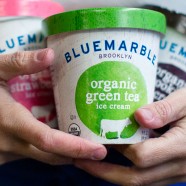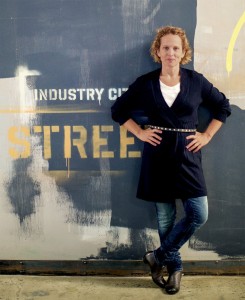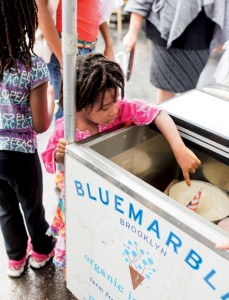
Making ice cream can be messy, albeit delicious, work. Jennie Dundas ’89 is dressed for a production day — jeans, sneakers, and a pink sweatshirt with the hood pulled up over a required hairnet. Large bags of organic sugar, tubs of pure maple syrup, and boxes of organic pecans line the walls. On this day, 44,000 mini-cups will be filled with four different seasonal flavors of ice cream for JetBlue’s first-class service. Jennie, CEO and co-founder of Blue Marble Ice Cream, based in Brooklyn, is at the production facility in Rhode Island to make sure it goes smoothly — tasting the first batches, hunting for missing raspberry sorbet cups, and contacting her team back in New York to confirm numbers and details. She is a petite person of calm and focused energy.
“She’s a hell of a salesperson, let me tell you,” says Tom Bucci, whose family owns Warwick Ice Cream in Rhode Island, where Blue Marble produces their wholesale products. “There’s no scrimping with her, only the best ingredients. She won’t compromise on quality, on nothing. Absolutely nothing.”
 Blue Marble, New York City’s only certified organic ice cream, started on a whim in 2007, when Jennie’s close friend, Alexis Gallivan, noticed there were no ice cream parlors in their Brooklyn neighborhood and thought the two of them should open one.
Blue Marble, New York City’s only certified organic ice cream, started on a whim in 2007, when Jennie’s close friend, Alexis Gallivan, noticed there were no ice cream parlors in their Brooklyn neighborhood and thought the two of them should open one.
“Something about it sounded right to me, and we started talking about a concept — all natural, consciously sourced ingredients,” says Jennie. “The idea of sourcing and telling people where ingredients come from wasn’t nearly as common as it is today. And no one in the New York market was doing that with ice cream.”
They opened their first store on Atlantic Avenue in late 2007. Seven months later they opened a second location in Prospect Heights. “We shot out of the gun at such a rapid pace. When we won ‘best new ice cream’ in New York City, it was really exciting and surprising, because neither of us had any business experience,” says Jennie. “I worked at Brigham’s in high school and I loved ice cream, but I never took a business class. My last math class was Honors Calculus at Milton! I had no idea what an Excel spreadsheet was. My dad offered to pay for a basic accounting class, but I didn’t take him up on it, and that was a mistake.”
Theater was Jennie’s domain. She became a professional actor at the age of 10, after a Boston-based play she was appearing in moved to Broadway. Working in television and movies, she juggled the life of actor and student during her Milton years. After majoring in theater at Brown University, she moved to New York to continue her successful acting career. Even as Blue Marble was getting off the ground, she was acting.
“As an entrepreneur, I use all my performing arts skills. You have to be a team player and know how to present yourself and your product. You have to fight the odds and take risks in spite of the statistics that say you won’t succeed. You have to think on your feet and come up with creative solutions at the drop of a hat. You have to inspire people. You have to keep your cool, because so much goes wrong.”
 What could go wrong? A newly hired bookkeeper turned out to be a scam artist. A shipping company didn’t keep the ice cream at the right temperature — a $60,000 loss. A Blue Marble truck filled with base mix blew up on the Brooklyn-Queens Expressway just moments after two of her employees got safely out of the vehicle. This incident shook Jennie to the core because she realized that the business was more than ice cream. “I felt responsible for people’s lives,” says Jennie.
What could go wrong? A newly hired bookkeeper turned out to be a scam artist. A shipping company didn’t keep the ice cream at the right temperature — a $60,000 loss. A Blue Marble truck filled with base mix blew up on the Brooklyn-Queens Expressway just moments after two of her employees got safely out of the vehicle. This incident shook Jennie to the core because she realized that the business was more than ice cream. “I felt responsible for people’s lives,” says Jennie.
While opening stores, working long hours, and learning the ice cream business, Jennie met a Rwandan woman in a theater workshop who thought an ice cream store in her hometown would do wonders. From that conversation, Jennie and Alexis ended up working with a group of women in Butare, Rwanda, to build Inzozi Nziza (Sweet Dreams), the town’s first-ever ice cream shop. Today, Alexis runs Blue Marble Dreams, their non-profit offshoot, and is focused on the next store, in Haiti. Jennie runs the ice cream business, which expanded into wholesale in 2011.
“Around when I had my son, we realized we didn’t want to scoop ice cream from behind a counter for the rest of our lives,” says Jennie. “But going wholesale is like starting a completely new business. The economics of wholesale differ significantly from the economics of retail. Achieving any profitability can take a while, because you must reach a certain critical volume. Again, a business education would have helped. But then, I don’t know if we would have taken the same risks.”
Today, Jennie spends most of her time at the main office, located in their small plant in Sunset Park, Brooklyn. She’s at the computer, working on numbers, logistics, sales and brand development. In addition to the stores and wholesale, Blue Marble sets up shop at outdoor markets and caters private events.
 “I feel like I’m doing air traffic control, taking a bird’s-eye-view of the whole business and looking at what I can tweak to make it run more smoothly. I’ve been fortunate to have had key advisors over the years, people who really know what they’re doing. But someone can tell you something over and over, and you are not going to understand it until you experience it. We had a couple of years in which we lost money, and it wasn’t until that happened that I fully understood how to fix that. We are successful because we achieved a certain magic with our product and our brand. Our look, our feel and our story is all real, but, ultimately, if you don’t have your numbers straight, none of that matters.”
“I feel like I’m doing air traffic control, taking a bird’s-eye-view of the whole business and looking at what I can tweak to make it run more smoothly. I’ve been fortunate to have had key advisors over the years, people who really know what they’re doing. But someone can tell you something over and over, and you are not going to understand it until you experience it. We had a couple of years in which we lost money, and it wasn’t until that happened that I fully understood how to fix that. We are successful because we achieved a certain magic with our product and our brand. Our look, our feel and our story is all real, but, ultimately, if you don’t have your numbers straight, none of that matters.”
Last Thanksgiving, the New York Daily News named Blue Marble as the best vanilla ice cream to “go with your pie” and described the vanilla as “textbook perfection.”
“We have a lot more competitors now, and we still are able to stay at number one. With all our hard knocks and challenges, we still found success and are doing something original. That feels like a huge accomplishment.”
by Liz Matson



